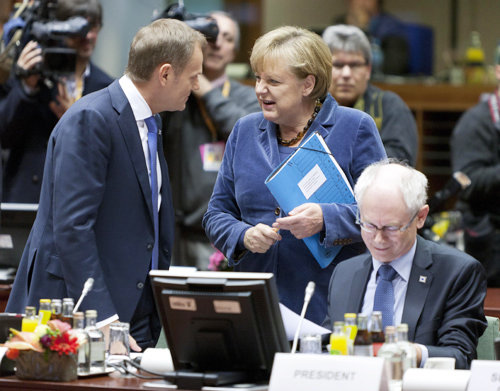|
 |
|
CONSULTATION: German Chancellor Angela Merkel chats with Polish Prime Minister Donald Tusk (left) during an EU summit in Brussels on October 26 (XINHUA) |

While the global financial crisis continued to take a toll on societies and politics globally, 2011 has been a year of relentless turmoil and chaos. What underlies these waves of turmoil is the labor pains of the birth of a new international order.
Economic growth was severely unbalanced in 2011. The European and U.S. debt crises have gravely delayed the recovery of the world economy. Though the United States raised its debt ceiling after heated debate to avoid default, the Standard & Poor's rating agency downgraded the credit rating of the United States for the first time.
Meanwhile, the collective action of EU countries in tackling their sovereign debt crisis has been sluggish and ineffective. Austerity measures and welfare cuts will help the countries overcome their current crisis, but they are against the popular will and opposed by opposition parties.
Therefore, economic growth is weak in the entire Western world. The International Monetary Fund (IMF) has projected growth in developed economies in 2011 at merely 1.6 percent.
Emerging economies, however, have become major driving forces behind the recovery of the world economy. Relying on domestic demand and South-South trade, emerging economies have achieved rapid growth. Their growth rate is estimated at 6.4 percent this year. China, in particular, may grow more than 9 percent. The rise of emerging economies has effectively prevented the global economy from a double-dip recession. IMF estimates show the global economy could register a growth rate of 4 percent this year.
Unfortunately, developed countries have resorted to loose monetary policies and protectionism in an attempt to shift their burden to other countries. Their policies have caused trouble for emerging economies and hindered their growth.
Based on the economic situation of 2011, recovery of the global economy in 2012 will be full of uncertainties. Economic growth will continue to be unbalanced with developing countries making rapid strides and developed countries struggling to achieve growth.
The international financial crisis has fueled social and political unrest in the Middle East as well as in Europe and North America. Social unrest in the Middle East has brought about the overturn of governments in Tunisia, Egypt and Yemen. Libya was plunged into a civil war that ended with the overthrow of the Muammar Gaddafi regime. Currently, Syria is faced with great domestic and international pressure.
Profound changes in the Middle East show that the position of the United States as the dominant global leader is in decline. Meanwhile, the influence of Iran and Turkey is on the rise in the region while Israel is more isolated.
Social conflicts and extremism in Europe and the United States also gained ground. A shocking massacre by a right-wing extremist occurred in Norway in July. London experienced alarming riots and the "Occupy Wall Street" movement spread across the United States.
2011, dubbed the "year of global indignation," revealed three major social problems of the current world.
First, the financial crisis has caused rising income disparities. Living standards of the middle class were severely impacted as their wealth shrank by a wide margin. The "Occupy Wall Street" movement was an example of public anger over U.S. financial institutions and inequality in society.
Second, rapidly developing information technology and globalization have brought people together. With the help of new media and non-state actors, the long-standing corrupt practices of "strongman politics" in the Middle East and North Africa and "crony democracy" in the Western world have been exposed widely to the public. Turmoil in one country can easily spread to other countries.
Third, the unbalanced population and employment structure have aggravated social tensions. The long-term unemployment of young people has made "young malcontents" a common problem of the whole world.
Looking to the future, reconstruction in countries that have experienced regime changes in the Middle East and North Africa will be arduous because of domestic instability and external intervention. While the Middle East undergoes a period of uncertainty, social conflicts may break out again in the Western world.
The changing international pattern has spurred competition between two economic power blocs—developed Western countries and emerging countries. The economic growth rate of emerging countries is now several times that of Western countries, and they are taking up an increasingly larger share of the global GDP. In the meantime, the status of Western countries is falling in the wake of their complex social and economic crises.
| 